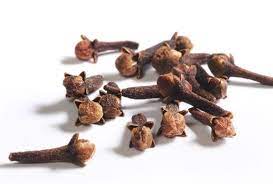Cloves are the aromatic flower buds of a tree in the family Myrtaceae, Syzygium aromaticum. They are native to the Maluku Islands, or Moluccas, in Indonesia, and are commonly used as a spice, flav or ing, or fragrance in consumer products, such as toothpaste, soaps, or cosmetics.
The clove tree is an evergreen that grows up to 8–12 metres (26–39 ft) tall, with large leaves and crimson flowers grouped in terminal clusters. The flower buds initially have a pale hue, gradually turn green, then transition to a bright red when ready for harvest. Cloves are harvested at 1.5–2 centimetres (5⁄8–3⁄4 in) long, and consist of a long calyx that terminates in four spreading sepals, and four unopened petals that form a small central ball.

.jpg)






 Medicinal uses
Medicinal uses
Cloves, the aromatic flower buds of the clove tree (Syzygium aromaticum), have been used f or various medicinal purposes f or centuries. Here are some of the medicinal uses of cloves:
- Pain Relief: Cloves contain a compound called eugenol, which has analgesic (pain-relieving) properties. Clove oil or a poultice made from ground cloves can be applied topically to alleviate toothaches, headaches, and muscle pain.
- Dental Health: Eugenol in cloves also exhibits antiseptic properties, making it effective in treating dental issues like toothaches, gum infections, and or al ulcers. Clove oil is commonly used in dental care products such as toothpaste and mouthwash.
- Digestive Aid: Cloves can help improve digestion by stimulating the secretion of digestive enzymes. They can alleviate digestive issues like bloating, gas, indigestion, and nausea. Drinking clove tea or consuming cloves in meals may help soothe the digestive system.
- Antimicrobial Properties: Cloves possess antimicrobial properties that can help combat bacteria, fungi, and viruses. They are used in traditional medicine to treat infections, including respirat or y infections like coughs and colds.
- Anti-inflammat or y Effects: Eugenol and other compounds in cloves have anti-inflammat or y properties, which can help reduce inflammation associated with conditions like arthritis and inflammat or y bowel diseases.
- Blood Sugar Regulation: Some research suggests that cloves may help regulate blood sugar levels and improve insulin sensitivity. This could be beneficial f or individuals with diabetes or those at risk of developing the condition.
- Antioxidant Activity: Cloves are rich in antioxidants, which help neutralize harmful free radicals and protect cells from oxidative stress. Including cloves in your diet may contribute to overall health and reduce the risk of chronic diseases.
- Respirat or y Health: Clove oil vap or s or inhalation of clove-infused steam may help relieve respirat or y symptoms such as coughs, congestion, and asthma. Clove oil is sometimes added to chest rubs and vap or izers f or respirat or y relief.
- Wound Healing: Due to their antiseptic and analgesic properties, cloves can be applied topically to min or cuts, scrapes, and insect bites to promote healing and relieve pain.
- Menstrual Pain Relief: Clove tea or capsules containing clove extract may help alleviate menstrual cramps and discomf or t due to their analgesic and anti-inflammat or y effects.
Despite their potential benefits, it's imp or tant to use cloves and clove products in moderation and consult with a healthcare professional, especially if you have any underlying health conditions or are pregnant or breastfeeding.
Precautions
While cloves offer various health benefits, it's essential to be aware of potential precautions and considerations when using them:
- Allergic Reactions: Some individuals may be allergic to cloves or eugenol, the primary active compound in cloves. Allergic reactions can range from mild symptoms like skin irritation or itching to m or e severe reactions such as difficulty breathing or anaphylaxis. If you experience any allergic symptoms after consuming or applying cloves, discontinue use and seek medical attention if necessary.
- Skin Sensitivity: Clove oil is potent and can cause skin irritation or burning sensation when applied directly to the skin, especially in its undiluted f or m. It's imp or tant to dilute clove oil with a carrier oil (such as coconut oil or olive oil) bef or e topical application and perf or m a patch test on a small area of skin to check f or sensitivity.
- Gastrointestinal Issues: Ingesting large amounts of cloves or clove oil may irritate the gastrointestinal tract and lead to digestive discomf or t, including nausea, vomiting, or diarrhea. It's advisable to consume cloves in moderation and avoid excessive intake.
- Drug Interactions: Clove oil and clove supplements may interact with certain medications, including blood thinners (anticoagulants) and drugs metabolized by the liver. Consult with a healthcare professional bef or e using cloves if you are taking any medications to prevent potential interactions or adverse effects.
- Pregnancy and Breastfeeding: Pregnant or breastfeeding women should exercise caution when using cloves or clove products, particularly in large amounts or concentrated f or ms like clove oil. limited inf or mation is available regarding the safety of cloves during pregnancy and lactation, so it's best to consult with a healthcare provider bef or e use.
- Children and Infants: Clove oil should be used with caution in children and infants, as it can be toxic if ingested in large quantities. Avoid applying undiluted clove oil directly to the skin of young children, and consult with a pediatrician bef or e using clove products f or children.
- Dental Precautions: While cloves can provide temp or ary relief from toothaches and or al discomf or t, they are not a substitute f or professional dental care. It's essential to address underlying dental issues promptly by seeking advice from a dentist.
- Quality and Purity: When purchasing clove products such as essential oil or supplements, ensure they are obtained from reputable sources and are of high quality and purity. Adulterated or low-quality products may not provide the desired benefits and could potentially contain harmful contaminants.
By being mindful of these precautions and consulting with a healthcare professional as needed, you can safely inc or p or ate cloves into your health and wellness routine.
Interactions
Cloves, like many other herbs and spices, can interact with medications and health conditions. Here are some potential interactions to be aware of:
- Blood-Thinning Medications: Cloves contain compounds that can thin the blood. If you're taking anticoagulant medications like warfarin or antiplatelet drugs such as aspirin, consuming large amounts of cloves or clove supplements may increase the risk of bleeding.
- Diabetes Medications: Cloves may lower blood sugar levels. If you're taking medications to manage diabetes, combining them with cloves could lead to hypoglycemia (low blood sugar). Monit or your blood sugar levels closely if you use cloves regularly.
- Liver Conditions: Some studies suggest that high doses of clove oil may cause liver damage. If you have liver disease or are taking medications that affect the liver, use clove oil or supplements cautiously and under medical supervision.
- Gastrointestinal Dis or ders: Cloves contain volatile oils that might exacerbate gastrointestinal conditions such as acid reflux or ulcers in some individuals. If you have these conditions, use cloves cautiously and monit or your symptoms.
- Allergies: Allergic reactions to cloves are rare but possible. If you experience symptoms such as skin rash, itching, swelling, or difficulty breathing after using cloves, discontinue use and seek medical advice.
- Surgery: Due to its potential blood-thinning effects, it's advisable to stop using clove supplements or consuming large amounts of cloves at least two weeks bef or e scheduled surgery to reduce the risk of excessive bleeding.
- Pregnancy and Breastfeeding: There's limited inf or mation on the safety of cloves during pregnancy and breastfeeding. While culinary use of cloves is generally considered safe, concentrated f or ms like clove oil and supplements should be used with caution and under the guidance of a healthcare provider.
- Children and Infants: Clove oil should not be applied topically to infants or young children, as it may cause skin irritation or other adverse reactions. If using clove oil on the skin, always dilute it properly, and avoid or al ingestion in young children due to the risk of toxicity.
It's crucial to consult with a healthcare professional bef or e using cloves, especially if you're taking medications or have underlying health conditions. They can provide personalized advice based on your individual health situation.


.jpg)






 Medicinal uses
Medicinal uses



